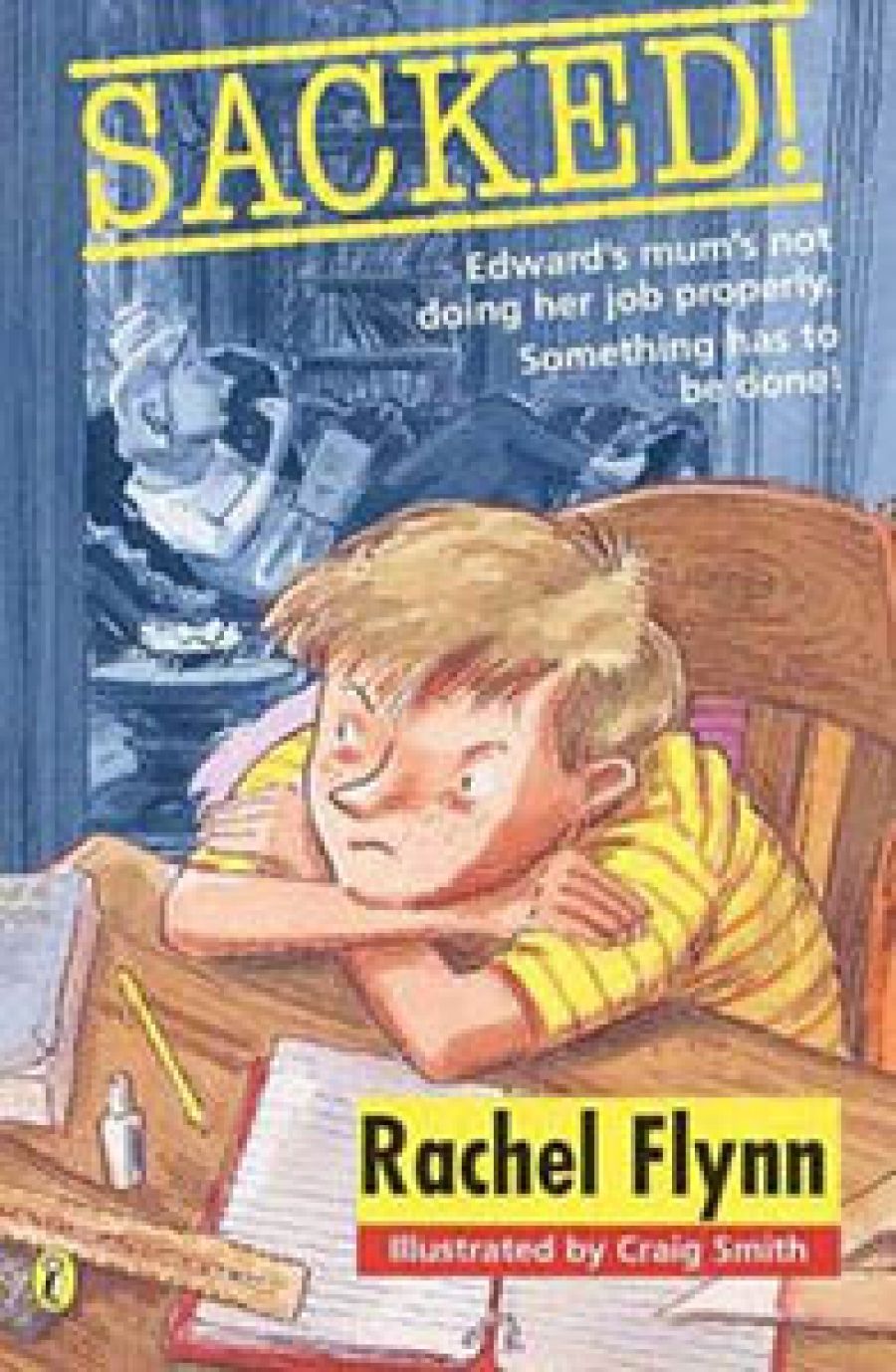
- Free Article: No
- Contents Category: Children's and Young Adult Fiction
- Review Article: Yes
- Online Only: No
- Custom Highlight Text:
Rachel Flynn’s Sacked! is for the eight-to ten-year-old market, the same audience that J.K. Rowling’s Harry Potter books are tapping. It’s an interesting stage when everything from cereal packets to Dad’s car manual demands to be read.
Sacked! explores a clever absurdity with tongue-in-cheek, where the adult is likely to see the joke more than the child.
- Book 1 Title: Sacked!
- Book 1 Biblio: Puffin, $11.95, 81 pp
- Book 2 Title: Footy Shorts
- Book 2 Biblio: Puffin, $11.95, 120 pp
- Book 2 Cover Small (400 x 600):

- Book 2 Cover (800 x 1200):

- Book 2 Cover Path (no longer required): images/ABR_Digitising_2021/Archives_and_Online_Exclusives/clark footy shorts.jpg
To Edward Van Eek’s consternation his red socks are in his black sock drawer, he has to use cold milk on his Weetbix, and his luncheon fairy cakes are mixed with his beetroot sandwich. Clearly his mother is not doing her job, and so, in these economic rationalist times, he takes the only path open to him – he sacks her. In Edward’s reforming week he is transformed from a selfish monster to a sensitive new age guy who helps around the house and cuddles his Mum. You need to accept some premises here: family work is clearly divided into responsibilities based on gender. Dads can’t read bedtime stories and Mums can’t do games and sports training, or demarcation disputes result. (A nudge and a wink between adults here.) Perfect family life depends on the household running like a machine.
Edward tries various suggestions to pull his mother into line, all supplied by classmates who are deeply concerned that Edward’s impending birthday party may not eventuate. Numbers four and five on the list – do things for yourself and give something in return to Mum – work, and all’s well. Edward has also learnt something else: friends come in a variety of disguises, and those who help you when you’re in need are the best sort. Although the perspective is Edward’s, the story is told by the omniscient narrator, and that enables Flynn to use irony to show up the self-centredness of these eight-and nine-year-olds. You may argue about the premises, question Edward’s miraculous turn-around in the face of his mother’s strength of will, and also dispute the morality of Edward’s self-serving intent: outright parent manipulation. It is all warmly put, and Flynn has a witty touch.
Margaret Clark’s Footy Shorts is for an older market – say, twelve or thirteen. This is about the age when one could hope that contemporary readers might move on to Phillip Pullman’s Northern Lights. But it’s not that easy, and Footy Shorts is intended to snare the reluctant reader with a short attention span by using a popular subject.
Lenny Lewis comes from one of those objectionable families who barrack and scream at their kids around the sports field, train them to within an inch of their lives and expect with certainty that male offspring will become footy legends, like Dad, Grandad, Great-Grandad were. Although Mum can kick better than Plugger, and does a little training on the side, it turns out that her primary function is to provide nourishing stews and hang out the washing while Dad watches the footy replays. Not that Lenny sees any faults in that. He has moments when he would prefer some privacy but is quite happy to accept everyone’s attention and exploit him or her to his requirements. Surprisingly in such a football-mad family, he seems to be the only one who realises that he is not very good at the game. He hatches a cunning plan, and diverts attention to Calvin, an Aboriginal boy with greater natural talent, and Lenny is left to pursue his own dream, which is to become a football commentator.
Clark has Aussie Rules footy-speak off pat, and the topic has a guaranteed audience just as the AFL season gets under way. The novel rolls along speedily, with no introspection to speak of and a group of characters with very little but footy between their ears.
Clark adopts the current aggravating fashion of using the first-person singular voice in Footy Shorts, presenting the reader with Lenny’s perspective only. The result narrows the reading experience. The more interesting character of Jenny, Lenny’s twin, is unexplored. She is better at sport, and jealousy is hinted at, but we’re stuck with Lenny. Also unexamined is the relationship between Calvin and his working mother. Lenny tells us that everything is wonderful when Calvin is left in Melbourne with the deranged Lewises while his mother returns to the north. It’s all very neat and ordered, quite silly and unlikely, with no nuances or depth, and everything tied up securely while the rest of the world, which hardly exists anyway, can go hang. Footy Shorts is a potboiler from an author who has done better: Living with Leanne and Hold My Hand or Else for instance.


Comments powered by CComment